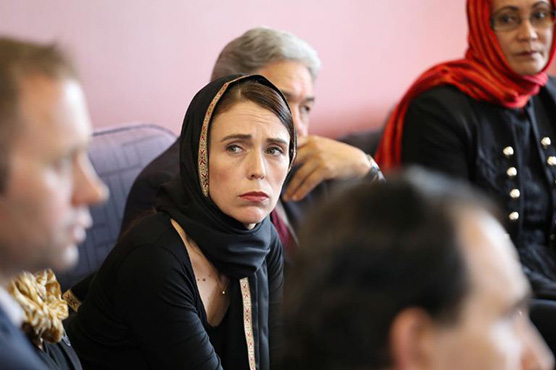New Zealand PM Ardern targets gun reform laws after weekend of mourning

NZ PM Jacinda Ardern meets representatives of the Muslim community at Canterbury refugee centre
CHRISTCHURCH (Reuters) - Tightening New Zealand’s gun laws is at the top of Prime Minister Jacinda Ardern’s agenda as she meets with her cabinet on Monday for the first time since the mass shooting in Christchurch that killed dozens of Muslim worshippers.
The death toll from the massacre stands at 50, with another 50 people injured, after a gunman burst into a mosque and opened fire on worshippers with a semi-automatic rifle and high-capacity magazines, and then attacked a second mosque.
Australian Brenton Tarrant, 28, a suspected white supremacist, was charged with murder on Saturday. Tarrant was remanded without a plea and is due back in court on April 5 where police said he was likely to face more charges.
Ardern was the first signatory of a national condolence book for the worst peacetime mass killing in New Zealand that she opened in the capital Wellington on Monday.
“On behalf of all New Zealanders, we grieve together. We are one. They are us,” she wrote in the book.
The shock of the attacks has led to calls for an immediate tightening of laws to restrict access to some firearms, particularly semi-automatic weapons such as the AR-15 rifle used by the shooter in Christchurch.
“What the public rightly are asking right now is why is it and how is it that you are currently able to buy military style semi-automatic weapons in New Zealand, and that’s the right question to ask,” Ardern told TVNZ earlier on Monday.
“There are ways we can bring in affective regulation of firearms that actually target those we need to target and that is our focus.”
New Zealand, a country of only 5 million people, has an estimated 1.5 million firearms.
A Radio New Zealand report said more than 99 percent of people who applied for a firearms licence in 2017 were successful.
The report was based on police data secured through an Official Information Act request, although it was not clear who made the request as those details had been redacted.
In 2017, there were 43,509 firearm licence applications, and only 188 applications were declined, the data showed.
After Ardern vowed at the weekend to change the gun laws, there were media reports that people were rushing to buy guns before any ban was implemented.
New Zealand’s top online marketplace Trade Me Group said it was halting the sale of semi-automatic weapons in the wake of Friday’s attack.
Police were out in force on Monday to assure Christchurch residents of their safety as they returned to their weekday lives, after a lockdown affected parts of the city on Friday after the shootings.
Police said the airport in the southern city of Dunedin, had been reopened early on Monday after a suspicious item found on the airfield turned out to be a hoax object.
And Australian police executed two search warrants in towns on the New South Wales mid-north coast related to the investigation.
BURIAL FRUSTRATIONS
Frustration was building among the families of victims as under Islam it is custom to conduct burials within 24 hours, but bodies will not be released until post mortems are carried out.
The burial process, which usually involves washing with three kinds of water, salving wounds and scrubbing skin, would be complicated, volunteers in Christchurch said.
Mo, a volunteer who had flown in from Brisbane to wash the bodies, said the people who died in the mosques were classified as martyrs. That meant there were different views as to whether they would be washed or not because he said Islamic jurisprudence said martyrs are not to be washed as their blood was witness to their martyrdom.
“But some people have said because it was not a battlefield it is okay to wash the body. But it is at the discretion of the family,” said Mo. He asked to be identified by just one name.

